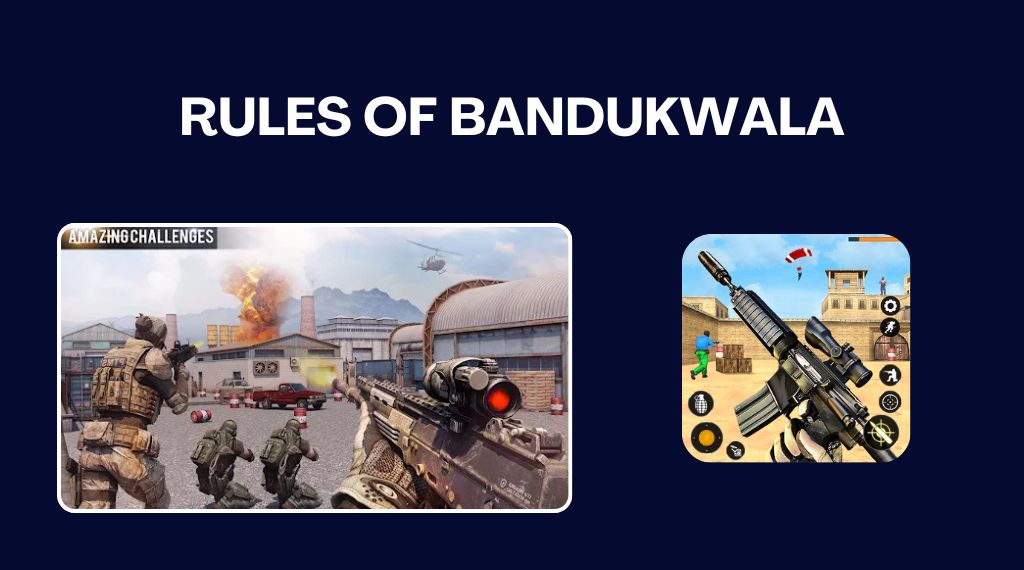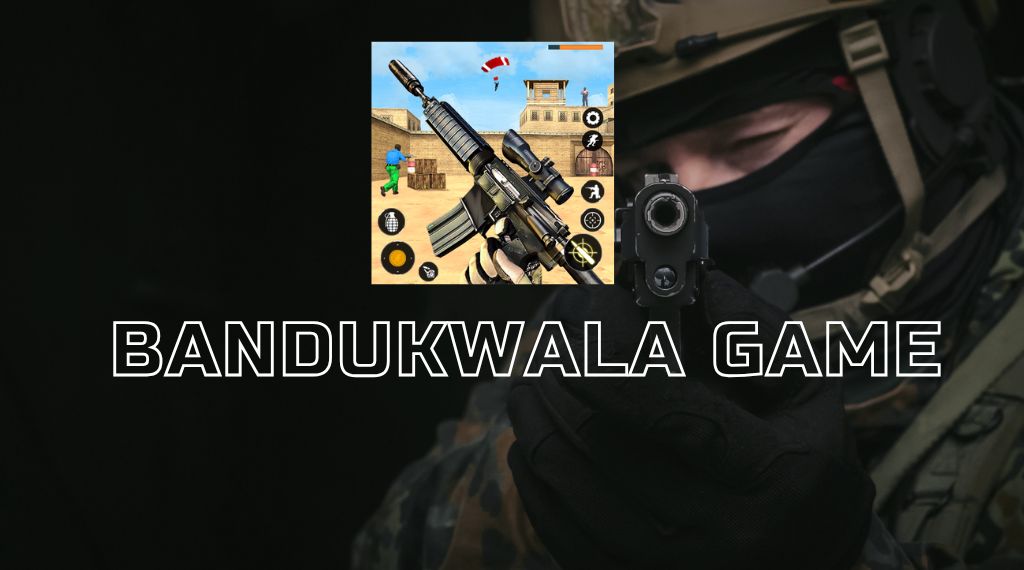Bandukwala Game, a traditional card game with roots in South Asia, has been a source of entertainment and social interaction for generations. Known for its simplicity, yet strategic depth, Bandukwala has captivated players of all ages. This comprehensive guide will delve into the history, rules, strategies, and cultural significance of Bandukwala, providing you with everything you need to know about this fascinating game.
History of Bandukwala Game

Origins and Evolution
Bandukwala Game is believed to have originated in the Indian subcontinent, with its roots tracing back to the Mughal era. The game was initially played by royalty and nobility, serving as a pastime that combined elements of strategy and chance. Over time, Bandukwala spread across different regions, adapting to local cultures and preferences.
The name “Bandukwala” is derived from the Hindi word “Banduk,” meaning gun, and “wala,” meaning person. This nomenclature is thought to reflect the game’s competitive nature, where players “shoot” their cards to outwit their opponents.
Cultural Significance
Bandukwala holds a special place in South Asian culture. It is often played during festivals, family gatherings, and social events, fostering a sense of community and camaraderie. The game’s simplicity and accessibility have made it a favorite among people of all ages, transcending social and economic barriers.
Understanding the Basics
What is Bandukwala?
Bandukwala is a trick-taking card game typically played with a standard deck of 52 cards. The game can be played by 2 to 6 players, with each player aiming to win tricks and accumulate points. The game’s objective is to be the first to reach a predetermined score, usually 100 points.
Objective of the Game
The primary objective of Bandukwala is to win tricks by playing higher-ranking cards than your opponents. Each trick consists of one card played by each player, and the player with the highest-ranking card wins the trick. The game continues until all cards have been played, and the player with the most points at the end of the game is declared the winner.
Equipment Needed
To play Bandukwala, you will need the following:
- A standard deck of 52 playing cards
- A flat surface to play on
- A scorekeeping method (pen and paper or a digital app)
Rules of Bandukwala Game

Setting Up the Game
- Number of Players: Bandukwala Game can be played by 2 to 6 players.
- Dealing the Cards: The dealer shuffles the deck and deals an equal number of cards to each player. The number of cards dealt depends on the number of players:
- 2 players: 13 cards each
- 3 players: 17 cards each (with one card left out)
- 4 players: 13 cards each
- 5 players: 10 cards each (with two cards left out)
- 6 players: 8 cards each (with four cards left out)
- Determining the Trump Suit: After dealing the cards, the dealer reveals the top card of the remaining deck. The suit of this card becomes the trump suit for the game.
Gameplay Mechanics
- Starting the Game: The player to the left of the dealer starts the game by playing any card from their hand. The suit of this card determines the lead suit for the trick.
- Playing the Trick: Each player, in turn, must play a card of the lead suit if they have one. If they do not have a card of the lead suit, they can play any card, including a trump card.
- Winning the Trick: The player who plays the highest-ranking card of the lead suit wins the trick. If a trump card is played, the highest-ranking trump card wins the trick.
- Collecting Tricks: The player who wins the trick collects the cards and places them face down in front of them. This player then leads the next trick.
- Continuing the Game: The game continues until all cards have been played. The player with the most tricks at the end of the game is the winner.
Scoring and Winning
- Calculating Points: Each trick is worth one point. The player who wins the most tricks scores the highest number of points.
- Winning the Game: The first player to reach a predetermined score (usually 100 points) wins the game. If multiple players reach the target score in the same round, the player with the highest total points is declared the winner.
Strategies and Tips
Basic Strategies
- Lead with Strong Cards: When you have a strong hand, consider leading with high-ranking cards to win tricks early in the game.
- Conserve Trump Cards: Trump cards are powerful and should be used strategically. Avoid using them too early unless necessary.
- Observe Opponents’ Plays: Pay attention to the cards your opponents play. This can give you valuable information about their remaining cards and help you make better decisions.
Advanced Techniques
- Bluffing: Sometimes, playing a low-ranking card when you have a strong hand can mislead your opponents and give you an advantage in later tricks.
- Counting Cards: Keep track of the cards that have been played. This can help you predict the remaining cards and plan your moves accordingly.
- Forcing Opponents to Play Trump Cards: If you suspect an opponent has a strong hand, try to force them to play their trump cards early, reducing their advantage in later tricks.
Common Mistakes to Avoid
- Overusing Trump Cards: Using trump cards too early can leave you vulnerable in later tricks. Use them wisely.
- Ignoring Opponents’ Plays: Failing to observe your opponents’ plays can lead to missed opportunities and poor decision-making.
- Playing Predictably: Always playing your highest-ranking cards can make your strategy predictable. Mix up your plays to keep your opponents guessing.
Variations of Bandukwala Game
Regional Differences
Bandukwala has several regional variations, each with its own unique rules and gameplay mechanics. Some popular variations include:
- Indian Bandukwala: Played with a standard deck of 52 cards, this version is the most common and follows the basic rules outlined above.
- Pakistani Bandukwala: Similar to the Indian version, but with slight variations in scoring and trump suit determination.
- Bangladeshi Bandukwala: This version often includes additional rules, such as bonus points for winning specific tricks or penalties for certain plays.
Modern Adaptations
With the rise of digital gaming, Bandukwala has also found its way into the online world. Several mobile apps and online platforms now offer digital versions of the game, allowing players to enjoy Bandukwala from the comfort of their homes. These digital adaptations often include features like multiplayer modes, tutorials, and leaderboards, making the game more accessible to a global audience.
Bandukwala Game in Popular Culture
References in Media
Bandukwala Game has been referenced in various forms of media, including movies, television shows, and literature. These references often highlight the game’s cultural significance and its role in bringing people together.
Influence on Other Games
Bandukwala Game influence can be seen in several other card games, particularly those that involve trick-taking and strategic gameplay. Games like Bridge, Spades, and Hearts share similarities with Bandukwala, demonstrating its lasting impact on the world of card games.
How to Organize a Bandukwala Tournament

Planning and Preparation
- Determine the Format: Decide whether the tournament will be single-elimination, double-elimination, or round-robin.
- Set the Rules: Clearly define the rules and scoring system for the tournament.
- Choose a Venue: Select a suitable location that can accommodate all participants and provide a comfortable playing environment.
- Promote the Event: Use social media, flyers, and word-of-mouth to attract participants.
Rules and Regulations
- Registration: Set a deadline for registration and collect entry fees if applicable.
- Seeding: Seed players based on their skill level or randomly draw lots to determine matchups.
- Match Play: Ensure that each match follows the established rules and that players adhere to the code of conduct.
- Dispute Resolution: Have a system in place to handle disputes and ensure fair play.
Prizes and Recognition
- Prizes: Offer attractive prizes for the winners, such as cash, trophies, or gift cards.
- Recognition: Acknowledge all participants and celebrate their achievements, regardless of the outcome.
Benefits of Playing Bandukwala Game
Cognitive Benefits
- Improves Memory: Keeping track of played cards and opponents’ moves enhances memory and concentration.
- Enhances Strategic Thinking: Planning and executing strategies improve problem-solving skills and critical thinking.
- Boosts Mental Agility: Quick decision-making and adaptability are essential for success in Bandukwala.
see also apps related sites Click Here;
Social Benefits
- Fosters Social Interaction: Playing Bandukwala Game with friends and family strengthens relationships and builds camaraderie.
- Encourages Teamwork: In team variations of the game, players learn to collaborate and communicate effectively.
- Promotes Cultural Exchange: Bandukwala brings people from different backgrounds together, fostering cultural understanding and appreciation.
Emotional Benefits
- Reduces Stress: Engaging in a fun and challenging game can help alleviate stress and promote relaxation.
- Boosts Confidence: Winning games and mastering strategies can boost self-esteem and confidence.
- Provides a Sense of Accomplishment: Achieving goals and improving skills in Bandukwala can provide a sense of fulfillment and satisfaction.
FAQs About Bandukwala Game
How many players can play Bandukwala?
Bandukwala can be played by 2 to 6 players. The number of cards dealt to each player depends on the number of participants.
What is the trump suit in Bandukwala?
The trump suit is determined by revealing the top card of the remaining deck after dealing the cards. The suit of this card becomes the trump suit for the game.
Can I play Bandukwala online?
Yes, there are several digital platforms and mobile apps that offer online versions of Bandukwala, allowing you to play with friends or other players from around the world.
What are some common strategies in Bandukwala?
Common strategies include leading with strong cards, conserving trump cards, observing opponents’ plays, bluffing, and counting cards.
How do I win a Bandukwala game?
To win a Bandukwala game, you need to accumulate the most points by winning tricks. The first player to reach a predetermined score (usually 100 points) wins the game.
Conclusion
Bandukwala is more than just a card game; it is a cultural phenomenon that has brought people together for generations. Its rich history, simple yet strategic gameplay, and numerous benefits make it a timeless classic. Whether you’re a seasoned player or a beginner, this guide provides you with all the information you need to enjoy and excel at Bandukwala. So gather your friends and family, shuffle the deck, and let the games begin!


